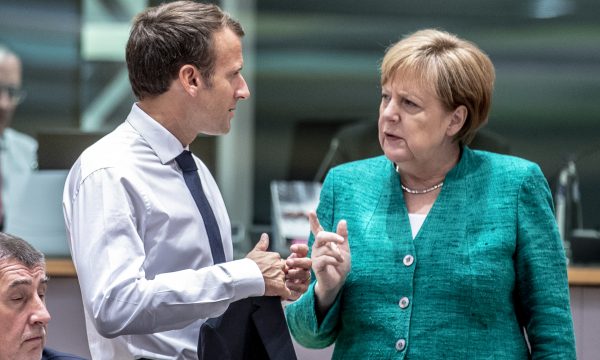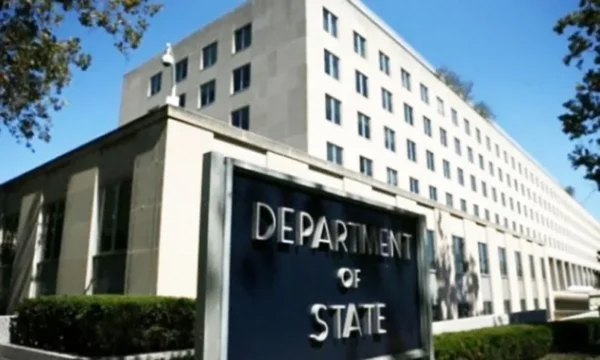
Lajme
string(64) "france-germany-against-swift-agreement-between-kosovo-and-serbia"
Gazeta Express
23/05/2020 14:26France, Germany against swift agreement between Kosovo and Serbia


Gazeta Express
23/05/2020 14:26Germany and France want resumption of the EU-led dialogue between Kosovo and Serbia as soon as possible. This was stated in a joint statement of French Foreign Minister Jean-Yves Le Drian and German Foreign Minister Heiko Maas.
In the joint declaration Berlin and Paris say that they are aware of the numerous open questions that must be solved before reaching an agreement. But they say that a serious approach requires well-structured, in-depth negotiations, with the EU as an honest broker. “More robust mediation and political resolve are needed – something you can expect from [the EU special representative on dialogue] Miroslav Lajčak and his team – with the backing of High Representative Borrell, as well as of Berlin and Paris,” according to the statement.
Also in the letter was mentioned France President Emmanuel Macron’s readiness to organise a second summit in Paris, adding however that readiness for dialogue is a prerequisite for that. Pristina-Belgrade dialogue was stalled in November 2018 after the then prime minister of Kosovo Ramush Haradinaj introduced 100 percent tariffs on all Serbian goods.
Efforts of Germany and France to unblock the dialogue has also joined the United States, but despite diplomatic efforts there is still no agreement between Kosovo political leaders on resumption of the dialogue with Serbia.
Kosovo’s caretaker prime minister, Albin Kurti, says the EU cannot be replaced in the dialogue process, whereas president Hashim Thaci, insists that the US should take the leading role in reaching a final agreement with Serbia. The Democratic League of Kosovo (LDK) hoping to come to power soon says that approach of Thaci towards the EU, and Kurti’s towards the US is harmful. They insist Kosovo should keep its partnership with Washington and Brussels. /GazetaExpress/
Read Joint article of French Foreign Minister Jean-Yves Le Drian and German Foreign Minister Heiko Maas
Germany and France: Re-start the EU-led dialogue now!
The corona virus has turned our daily lives upside down, with a risk to accentuate the conflicts, vulnerabilities, and inequalities that have already existed in Europe and the world for years. We are well aware of this risk, and willing to tackle it together through reinforced international and European cooperation.
It also puts some of our old conflicts and internal battles in a new perspective. It shows us where we need to change. And when we say “us”, we mean Europe as a whole – EU member states and the countries that are on the way to join our union. No region is closer to the EU than the Western Balkan Six – geographically, historically, politically and through our human bonds.
This is the reason we are reaching out to our partners in the Western Balkans today. We are in this together. This virus knows no borders. Neither should our response. Already in March, the European Union announced a support package for the Western Balkans to address the immediate needs of the health sector and to support the socio-economic recovery of the region The EU-Western Balkans Summit, held under Croatian Presidency on 6 May, reinforced this strong signal of solidarity. So far, over 3.3 billion Euros have been mobilized to the benefit of the Western Balkans This support goes far beyond what any other partner has provided to the region. On top of this unprecedented package, the EU also offers assistance through the facilitation of free movement of goods. This includes the unrestricted trade-flow of protective equipment such as masks or gloves and the establishment of Green Lanes to facilitate the crossing of borders between the EU and the Western Balkans. Member States are complementing the EU support bilaterally. Germany is planning to support the region with additional 10 million Euros and the French Development Agency is planning to increase its financial commitments to address the consequences of the crisis.
Our response underlines our commitment to the Western Balkans and the European perspective of the region. Despite the lockdown, on 25 March, European leaders agreed a new and more efficient enlargement methodology with an increased political commitment from all stakeholders to better support the reform process that all countries must undertake before joining the Union. And European leaders decided to open accession negotiations with Albania and North Macedonia.
Together with Serbia and Kosovo, we are determined to resolve all remaining obstacles. The unresolved situation between both countries remains a destabilizing factor for the entire Western Balkans and is as such a European security issue. It hinders much needed economic development and impedes political progress. For that purpose, EU Member States nominated one of Europe’s most seasoned diplomats, Miroslav Lajčak, as Special Representative for the dialogue between Belgrade and Pristina and for other regional issues. France and Germany stand ready to support him and his team with all of our political, diplomatic and economic potential. In April 2019, Chancellor Merkel and President Macron invited leaders of the region to a summit in Berlin. Now that Miroslav Lajčak has taken office, it is high time for the dialogue to restart. The goal should be to reach a sustainable, comprehensive, legally binding agreement between Belgrade and Pristina that solves all open issues and contributes to regional stability. President Macron has declared his readiness to hold a second summit in Paris. However, readiness for dialogue is a prerequisite for that.
We are aware of the numerous open questions that must be solved before reaching an agreement. There are no shortcuts and no quick fixes. A serious approach requires well-structured, in-depth negotiations, with the EU as an honest broker. More robust mediation and political resolve are needed – something you can expect from Miroslav Lajčak and his team – with the backing of High Representative Borrell, as well as of Berlin and Paris.
It is encouraging to see how pragmatically Kosovo and Serbia have been tackling the Corona virus across borders. We also welcome the decision by Prime Minister Kurti to suspend the 100 percent tariffs on goods from Serbia as well, as Bosnia and Herzegovina. We also expect Serbia to do its share of the efforts. In addition, we expect all agreements reached between Belgrade and Pristina since 2011, through the EU-facilitated dialogue, to be implemented.
This is not the time for political maneuvering. If anything, the current crisis will increase social tensions and political discontent. Taking the demands of the citizens seriously means strengthening institutions, tackling corruption and organized crime, and developing economic opportunities for everyone. That’s the way forward we suggest. That’s where we will be at your side.
Artikull i sponsorizuar
aaETC ndan 7 Vetura në 7 Qytete e mëdha të Kosovës
Pritjes i erdh fund! Rrjeti i marketeve më të mëdha në Kosovë, ETC ka njoftuar për fillimin e fazës...
Të tjera nga rubrika

Zyrtari i lartë i Departamentit amerikan sot viziton Kosovën

Valencia synon “bomberin” veteran Jamie Vardy, por has në konkurrencë të fortë

Biseda e fundit e pilotëve para rrëzimit të aeroplanit “Air India” që ua mori jetën rreth 270 vetave: Pse e ndale karburantin…?

“Kom pasë KANCER” – GETI flet për periudhën e rëndë në jetën e tij

“Nuk kam kontakt me ELVANA GJATËN”, befason Geti me relacionin e tij me këngëtaren që dikur e solli në tregun kosovar

Liverpooli ‘përshpejton’ procesin e trasferimit të lojtarit 100-milionësh
Te fundit

Zyrtari i lartë i Departamentit amerikan sot viziton Kosovën

Valencia synon “bomberin” veteran Jamie Vardy, por has në konkurrencë të fortë

Biseda e fundit e pilotëve para rrëzimit të aeroplanit “Air India” që ua mori jetën rreth 270 vetave: Pse e ndale karburantin…?

“Kom pasë KANCER” – GETI flet për periudhën e rëndë në jetën e tij

“Nuk kam kontakt me ELVANA GJATËN”, befason Geti me relacionin e tij me këngëtaren që dikur e solli në tregun kosovar

Liverpooli ‘përshpejton’ procesin e trasferimit të lojtarit 100-milionësh
✕





